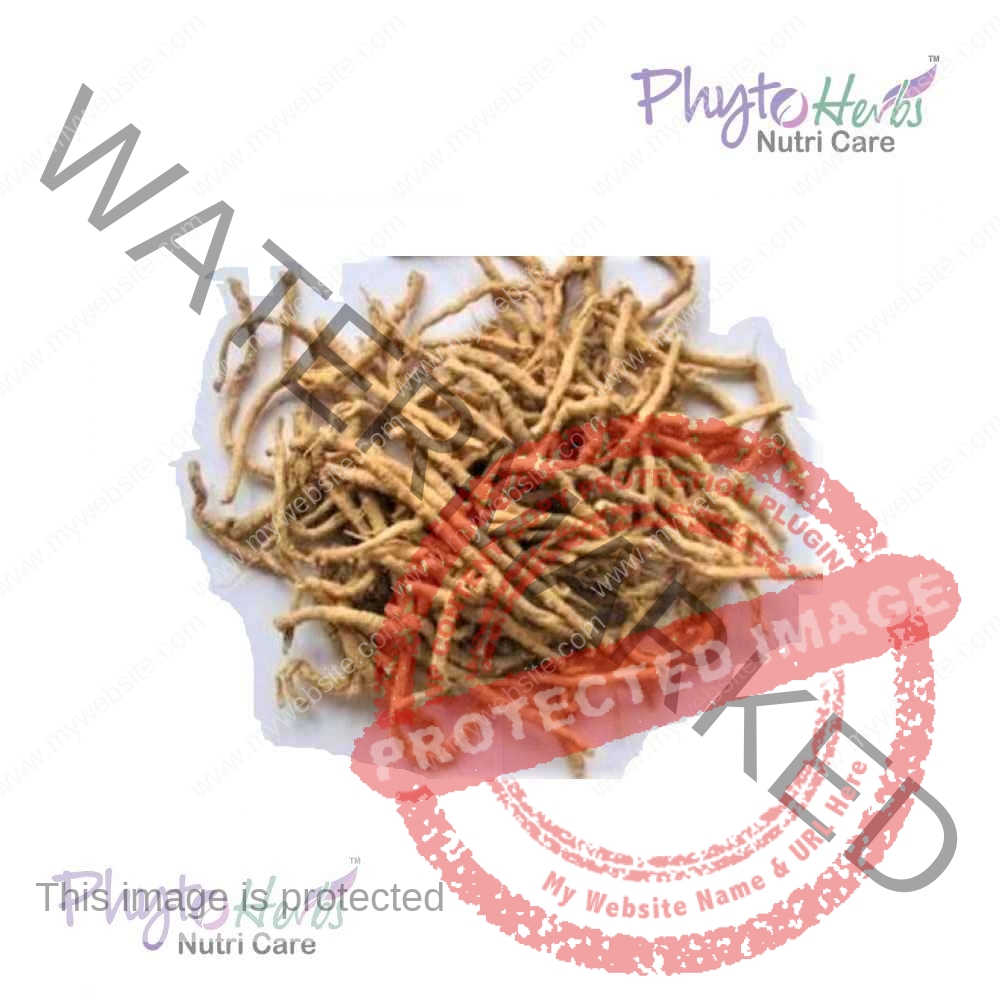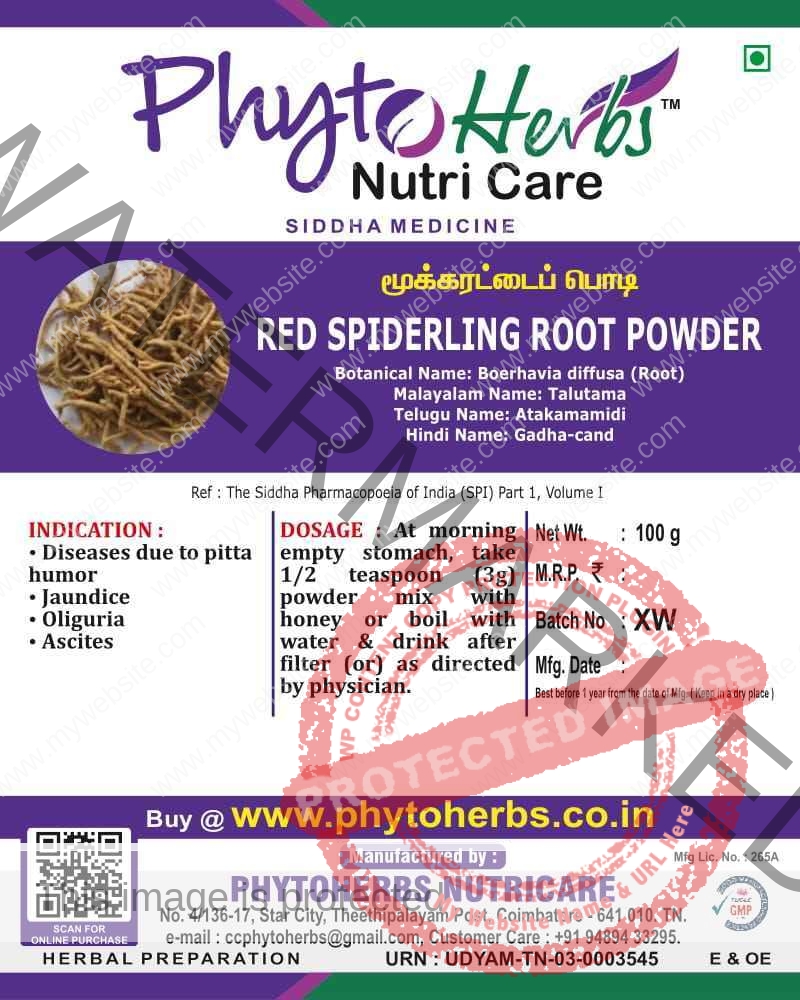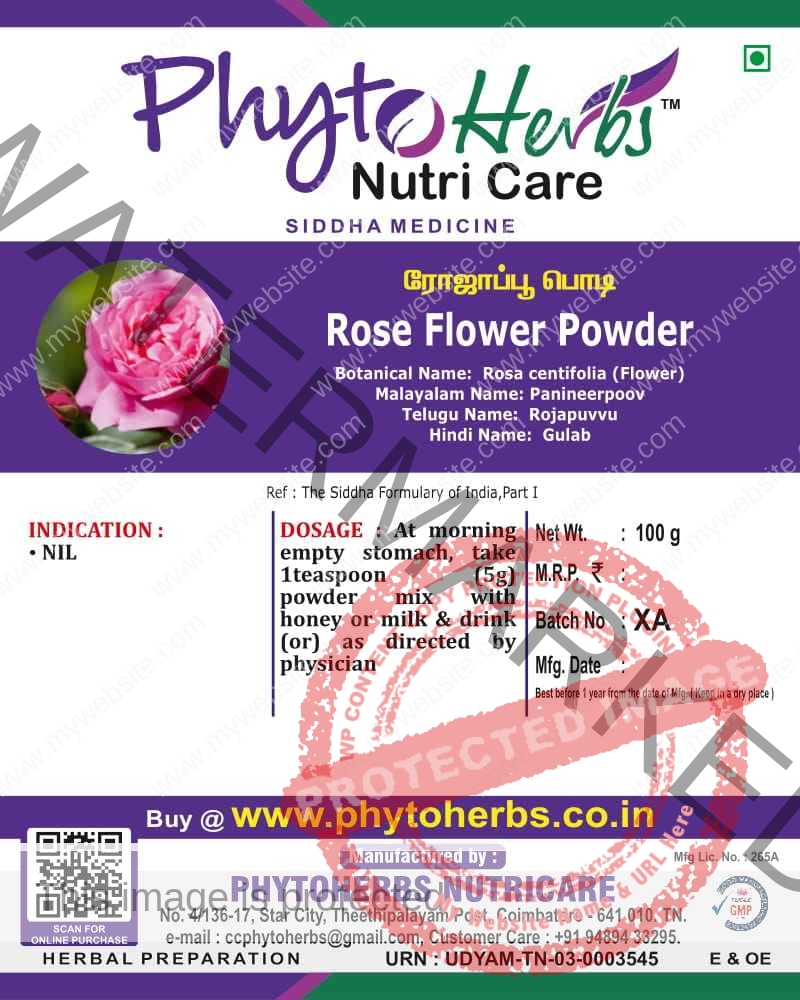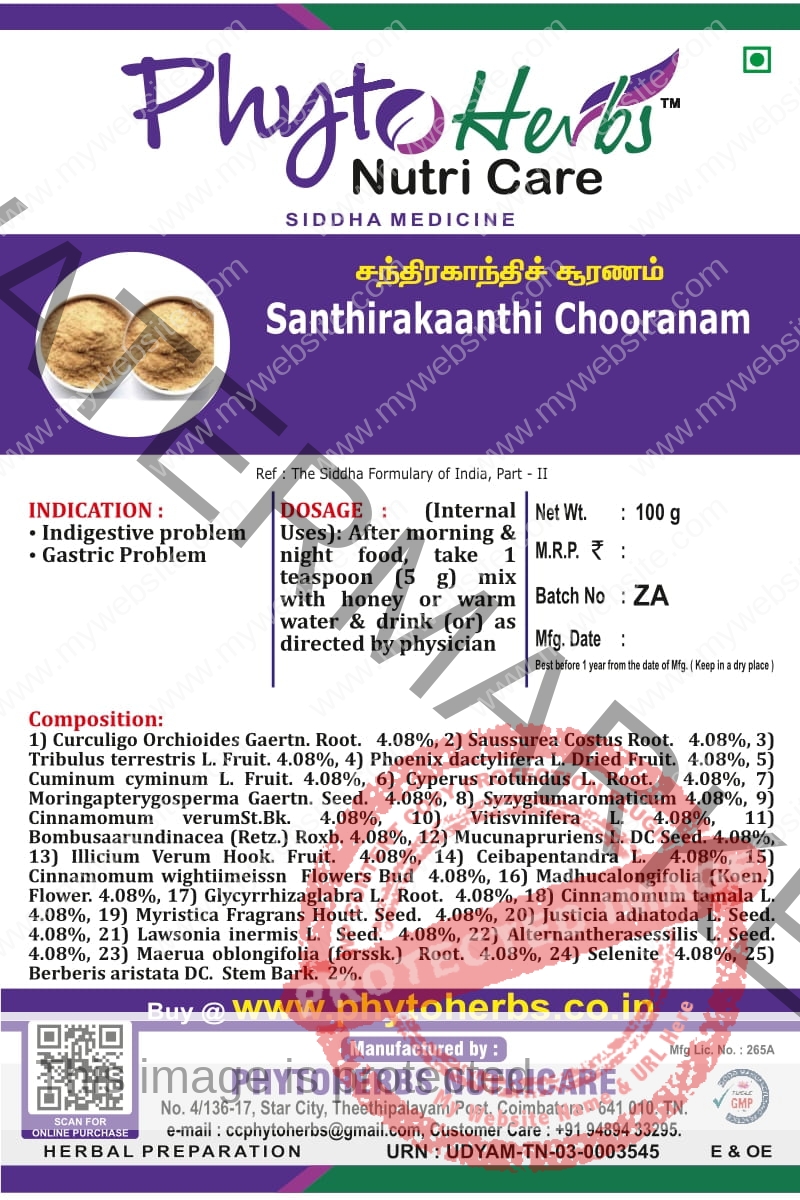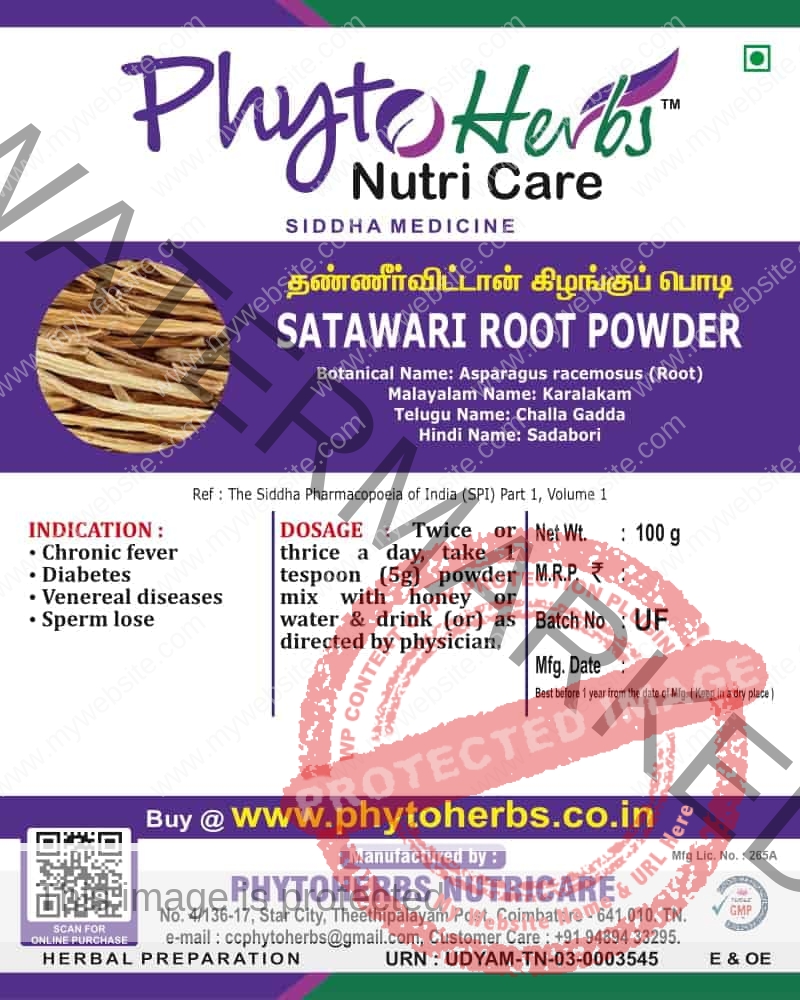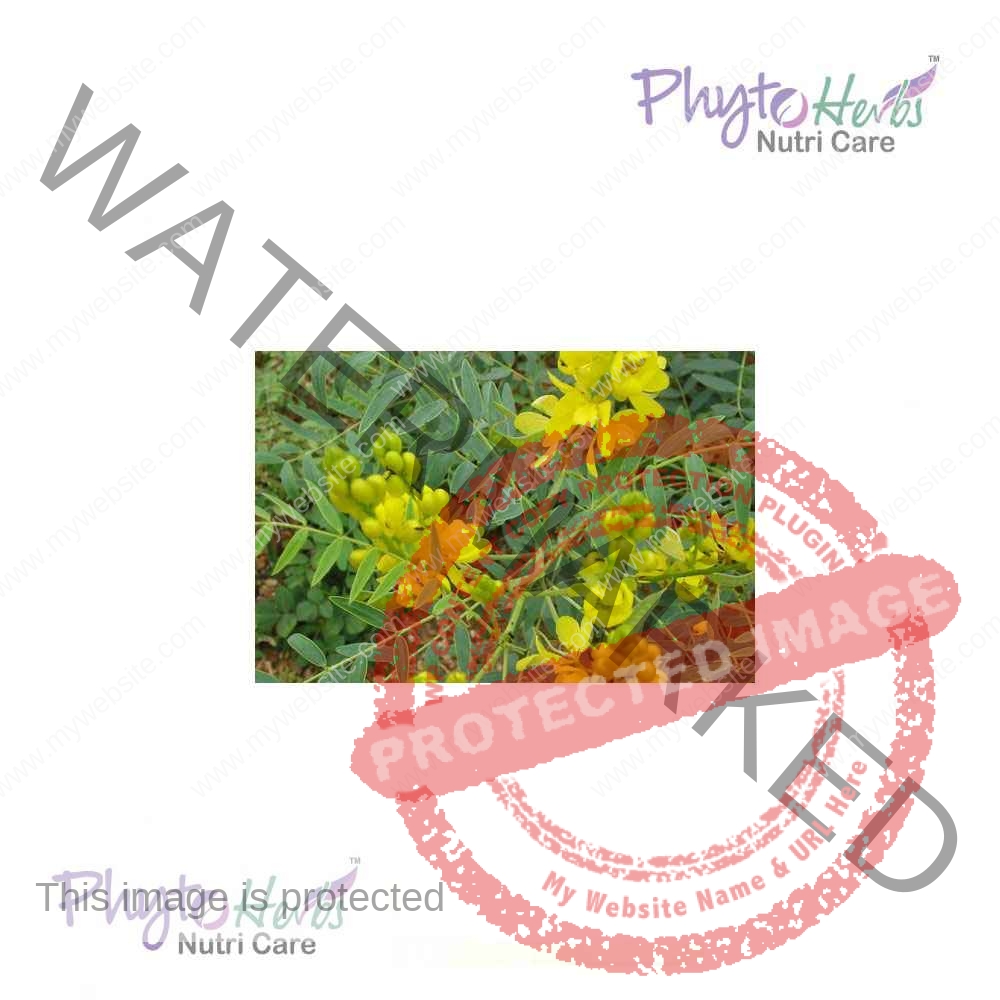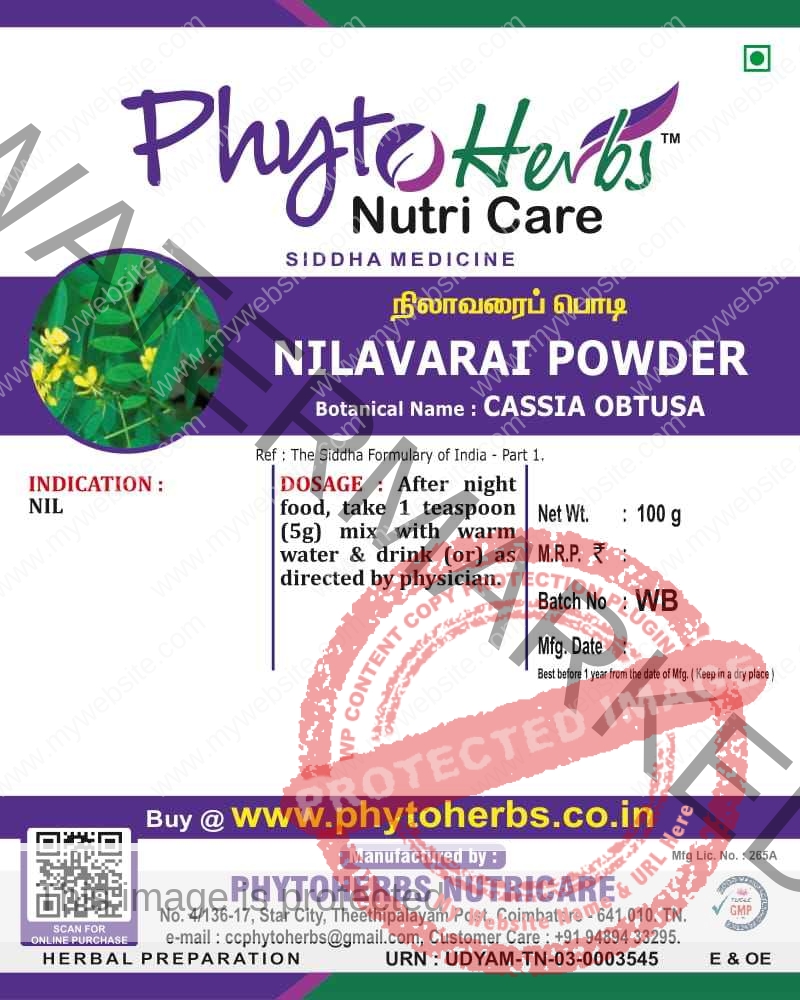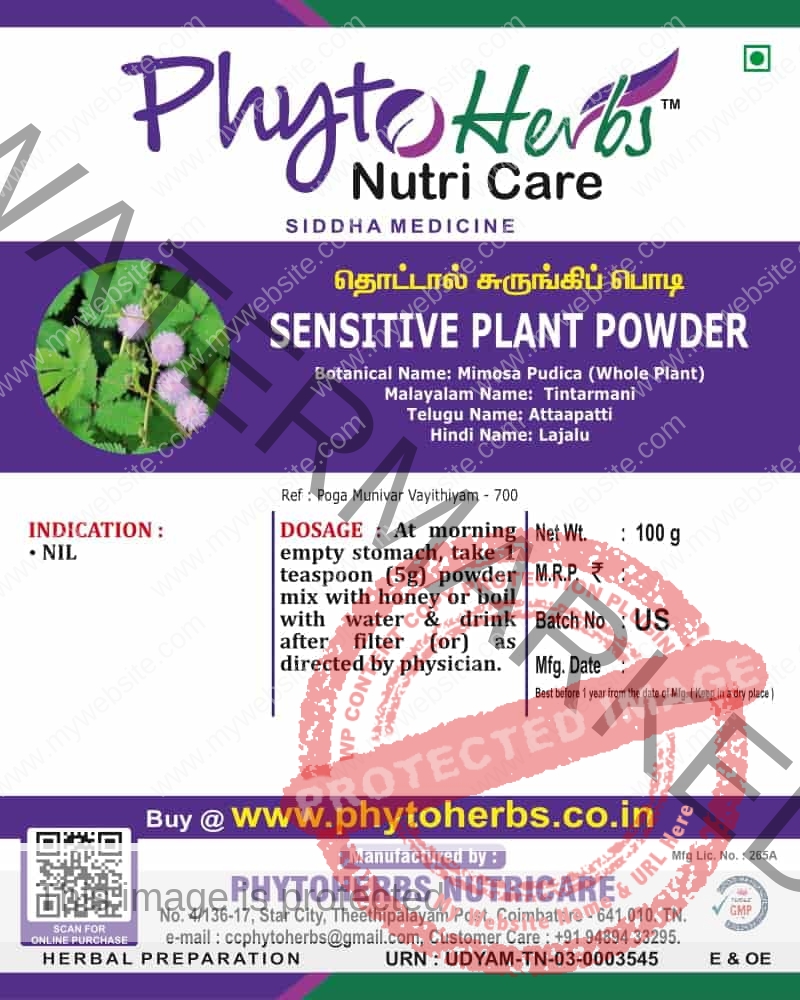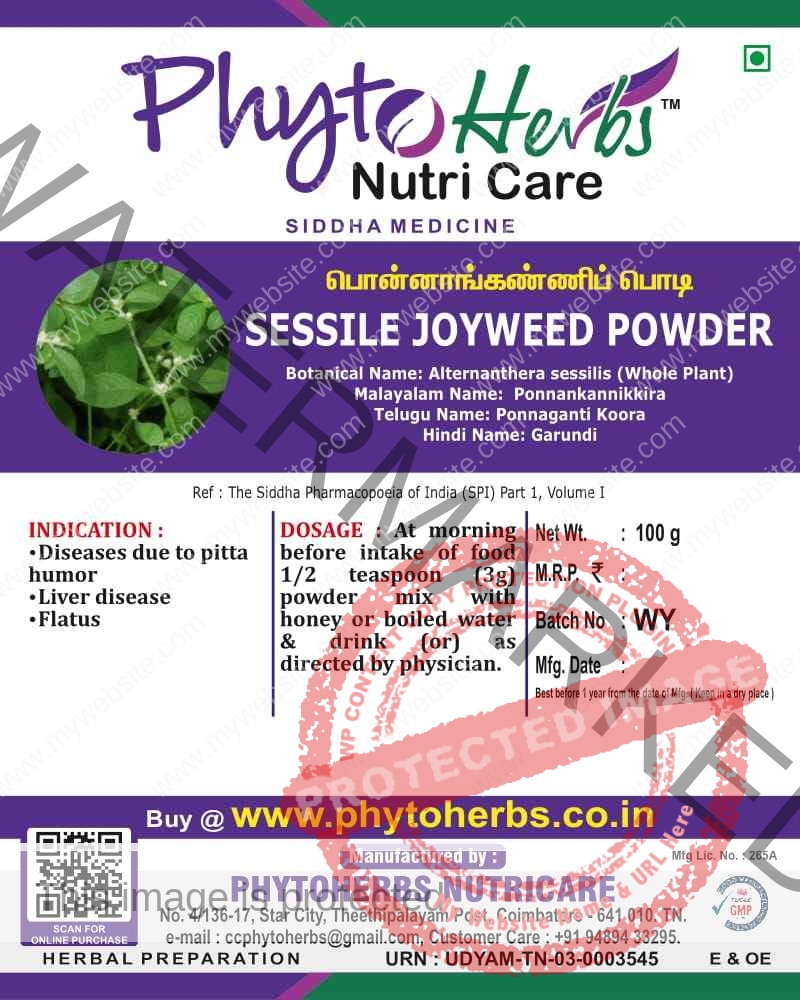Showing 217–228 of 275 results
Show filter-
Red Spiderling Root Powder / மூக்கிரட்டைப் பொடி
₹110.00 – ₹550.00Botanical Name: Boerhavia diffusa (Root)
Tamil Name: மூக்கிரட்டைப் பொடி / Mookirattai Podi
Malayalam Name: റ്റാലുടമ / Talutama
Telugu Name: అటకమామిడి / Atakamamidi
Hindi Name: गधा-कांड / Gadha-candDescription:
Red spiderling (Boerhavia diffusa) or Punarnava is an important rejuvenating drug used in Ayurveda. The whole plants viz root, leaves, flowers, seed etc. are used for medicinal purposes. Plant is used in Ayurvedic, Unani, Siddha and Homoeopathy Systems.
Therapeutic uses: The root, leaves, aerial parts and the whole plant of Red spiderling is used in different parts of India as well as worldwide for the treatment of a number of disorders e.g. liver complaint, kidney disorders, rheumatism and more. Root decoction is used to treat fever. It is reportedly used to treat internal inflammation of all kinds, dyspepsia, oedema, jaundice, cough, hemorrhoids, pulmonary cavitations, anaemia, enlargement of spleen, abdominal pain, abdominal tumours, cancers and acts as an antistress agent. The root possesses anticonvulsant, expectorant, laxative, and stomachic properties. It also treats அழல் நோய்கள் (Diseases due to deranged pitta humour), காமாலை, கீழ்வாயு, நமைச்சல், நீர் கட்டு (Oliguria | Anuria), பெருவயிறு (Ascites/Extended abdomen).Dosage: At morning empty stomach, take 1/2 teaspoon (3g) powder mix with honey or boil with water & drink after filter (or) as directed by physician.
-
Red Spiderling Root Powder / மூக்கிரட்டைப் பொடி
₹50.00Botanical Name: Boerhavia diffusa (Root)
Tamil Name: மூக்கிரட்டைப் பொடி / Mookirattai Podi
Malayalam Name: റ്റാലുടമ / Talutama
Telugu Name: అటకమామిడి / Atakamamidi
Hindi Name: गधा-कांड / Gadha-candDescription: Red spiderling (Boerhavia diffusa) or Punarnava is an important rejuvenating drug used in Ayurveda. The whole plants viz root, leaves, flowers, seed etc. are used for medicinal purposes. Plant is used in Ayurvedic, Unani, Siddha and Homoeopathy Systems.
Therapeutic uses: The root, leaves, aerial parts and the whole plant of Red spiderling is used in different parts of India as well as worldwide for the treatment of a number of disorders e.g. liver complaint, kidney disorders, rheumatism and more. Root decoction is used to treat fever. It is reportedly used to treat internal inflammation of all kinds, dyspepsia, oedema, jaundice, cough, hemorrhoids, pulmonary cavitations, anaemia, enlargement of spleen, abdominal pain, abdominal tumours, cancers and acts as an antistress agent. The root possesses anticonvulsant, expectorant, laxative, and stomachic properties. It also treats அழல் நோய்கள் (Diseases due to deranged pitta humour), காமாலை, கீழ்வாயு, நமைச்சல், நீர் கட்டு (Oliguria | Anuria), பெருவயிறு (Ascites/Extended abdomen).
Dosage: At morning empty stomach, take 1/2 teaspoon (3g) powder mix with honey or boil with water & drink after filter (or) as directed by physician.
-
Rose Flower Powder / ரோஜாப்பூ பொடி
₹90.00 – ₹450.00Botanical Name: Rosa centifolia (Flower)
Tamil Name: ரோஜாப்பூ பொடி / Roja Poo Podi
Malayalam Name: പനിനീർപൂവ് / റോസാപൂ / Panineerpoov / Rosapoo
Telugu Name: రోజాపువ్వు / Rojapuvvu
Hindi Name: गुलाब / GulabDescription:
Rosa centifolia (family: Rosaceae), cultivated as an ornamental plant throughout India. It is one of the herbs mentioned in all ancient scriptures viz., Ayurveda, Siddha, Homeopathy and Unani.
Pharamacological Properties: It has divers’ pharmacological used including asthma, hypertension and bronchitis. The roots are useful in intestinal ulcers, rickets, hemorrhages and diarrhea and also astringent in nature. The leaves are used in treating wounds, ophthalmia, hepatopathy and hemorrhoids. The flowers has aromatic, cardio tonic, antiinflammatory, expectorant, aphrodisiac, depurative, febrifuge, intellect-promoting styptic, digestive, carminative,
rejuvenating and tonic properties. It is also useful in asthma, high blood pressure, bronchitis, diarrhea, dysmenorrheal, cough, fever, fluid retention, insomnia, palpitation, and stress and urinary tract infections.Dosage: At morning empty stomach, take 1 teaspoon (5g) powder mix with honey or milk & drink (or) as directed by physician.
-
Rose Flower Powder / ரோஜாப்பூ பொடி
₹40.00Botanical Name: Rosa centifolia (Flower)
Tamil Name: ரோஜாப்பூ பொடி / Roja Poo Podi
Malayalam Name: പനിനീർപൂവ് / റോസാപൂ / Panineerpoov / Rosapoo
Telugu Name: రోజాపువ్వు / Rojapuvvu
Hindi Name: गुलाब / GulabDescription: Rosa centifolia (family: Rosaceae), cultivated as an ornamental plant throughout India. It is one of the herbs mentioned in all ancient scriptures viz., Ayurveda, Siddha, Homeopathy and Unani.
Pharamacological Properties: It has divers’ pharmacological used including asthma, hypertension and bronchitis. The roots are useful in intestinal ulcers, rickets, hemorrhages and diarrhea and also astringent in nature. The leaves are used in treating wounds, ophthalmia, hepatopathy and hemorrhoids. The flowers has aromatic, cardio tonic, antiinflammatory, expectorant, aphrodisiac, depurative, febrifuge, intellect-promoting styptic, digestive, carminative,
rejuvenating and tonic properties. It is also useful in asthma, high blood pressure, bronchitis, diarrhea, dysmenorrheal, cough, fever, fluid retention, insomnia, palpitation, and stress and urinary tract infections.Dosage: At morning empty stomach, take 1 teaspoon (5g) powder mix with honey or milk & drink (or) as directed by physician.
-
Santhirakaanthi Chooranam / சந்திரகாந்திச் சூரணம்
₹215.00 – ₹1,080.00Tamil Name: சந்திரகாந்திச் சூரணம் / Santhirakaanthi Chooranam
Malayalam Name: ശാന്തിരകാന്തി ചൂരണം / Sāntirakānti cūraṇaṁ
Telugu Name: శాంతిరకాంతి చూరణం / Sāntirakānti cūraṇaṁ
Hindi Name: शांतिकांथी चूर्णम / Shantirakaanthee choornamDescriptions:
Santhirakaanthi Chooranam contains herbal formulation of dried fruits, seeds, root, flower and bark from twenty five herbal plants in equal proportions. Composition:Composition :
1) Curculigo Orchioides Gaertn. Root. 4.08%
2) Saussurea Costus Root. 4.08%
3) Tribulus terrestris L. Fruit. 4.08%
4) Phoenix dactylifera L. Dried Fruit. 4.08%
5) Cuminum cyminum L. Fruit. 4.08%
6) Cyperus rotundus L. Root. 4.08%
7) Moringapterygosperma Gaertn. Seed. 4.08%
8) Syzygiumaromaticum 4.08%
9) Cinnamomum verumSt.Bk. 4.08%
10) Vitisvinifera L. 4.08%
11) Bombusaarundinacea (Retz.) Roxb. 4.08%
12) Mucunapruriens L. DC Seed. 4.08%
13) Illicium Verum Hook. Fruit. 4.08%
14) Ceibapentandra L. 4.08%
15) Cinnamomum wightiimeissn Flowers Bud 4.08%
16) Madhucalongifolia (Koen.) Flower. 4.08%
17) Glycyrrhizaglabra L. Root. 4.08%
18) Cinnamomum tamala L. 4.08%
19) Myristica Fragrans Houtt. Seed. 4.08%
20) Justicia adhatoda L. Seed. 4.08%
21) Lawsonia inermis L. Seed. 4.08%
22) Alternantherasessilis L. Seed. 4.08%
23) Maerua oblongifolia (forssk.) Root. 4.08%
24) Selenite 4.08%
25) Berberis aristata DC. Stem Bark. 2%Therapeutic Indications: மகாமூத்திர நோய், இந்திரிய நட்டம் [(விந்தணு விரயம்: Sperm lose)], யோனி நோய்கள் (Vaginal diseases), இரத்தப் பிரமேகம் (Blood related venereal infections), அழல் நோய்கள்.
Dosage (Internal Uses): After morning & night food, take 1 teaspoon (5 g) mix with honey or warm water & drink (or) as directed by physician.
-
Satawari Root Powder / தண்ணீர்விட்டான் கிழங்குப்பொடி
₹55.00Botanical Name: Asparagus racemosus (Root)
Tamil Name: தண்ணீர்விட்டான் கிழங்குப்பொடி / Thanneervittan Kizhangu Podi
Malayalam Name: ശതാവരി കിഴങ്ങു / Karalakam
Telugu Name: చల్ల గడ్డ / Challa Gadda
Hindi Name: नरकंट / SadaboriDescription: Satawari (Asparagus racemosus) is a climbing plant which grows in low forest areas throughout India. Asparagus racemosus (Satawari) is recommended in Ayurvedic and Siddha texts for prevention and treatment of gastric ulcers, dyspepsia and as a galactogogue. A. racemosus has also been used successfully by some Ayurvedic practitioners for nervous disorders, inflammation, liver diseases and certain infectious diseases. It is also useful in treatment of epilepsy, kidney disorders, chronic fevers, excessive heat, stomach ulcers and liver cancer, increases milk secretion in nursing mothers and regulates sexual behaviors. Medicinal uses: Asparagus racemosus cleanses, nourishes, and strengthens the female reproductive organs and so, it is traditionally used for PMS, amenorrhea, dysmenorrhea, menopause and pelvic inflammatory disease (PID) like endometriosis. Asparagus racemosus is considered as the most potent female health tonic. Asparagus racemosus also supports deeper tissue and builds blood, helping in treating infertility, prevents miscarriage and acts as a post-partum tonic as it increases lactation, regularizes the uterus and balances hormones, probably due to phyto-estrogens.
Therapeutic Uses: அனல், வெள்ளைபடுதல் (Leucorrhoea), நெடுநாட்பட்ட சுரம் (Chronic fever), நீரிழிவு (Diabetes), வெட்டை (Venereal diseases), விந்து நட்டம்.
Dosage: Twice or thrice a day, take 1 teaspoon (5g) powder mix with water & drink (or) as directed by physician.
-
Satawari Root Powder / தண்ணீர்விட்டான் கிழங்குப்பொடி
₹120.00 – ₹600.00Botanical Name: Asparagus racemosus (Root)
Tamil Name: தண்ணீர்விட்டான் கிழங்குப்பொடி / Thanneervittan Kizhangu Podi
Malayalam Name: ശതാവരി കിഴങ്ങു / Karalakam
Telugu Name: చల్ల గడ్డ / Challa Gadda
Hindi Name: नरकंट / SadaboriDescription:
Satawari (Asparagus racemosus) is a climbing plant which grows in low forest areas throughout India. Asparagus racemosus (Satawari) is recommended in Ayurvedic and Siddha texts for prevention and treatment of gastric ulcers, dyspepsia and as a galactogogue. A. racemosus has also been used successfully by some Ayurvedic practitioners for nervous disorders, inflammation, liver diseases and certain infectious diseases. It is also useful in treatment of epilepsy, kidney disorders, chronic fevers, excessive heat, stomach ulcers and liver cancer, increases milk secretion in nursing mothers and regulates sexual behaviors.
Medicinal uses: Asparagus racemosus cleanses, nourishes, and strengthens the female reproductive organs and so, it is traditionally used for PMS, amenorrhea, dysmenorrhea, menopause and pelvic inflammatory disease (PID) like endometriosis. Asparagus racemosus is considered as the most potent female health tonic. Asparagus racemosus also supports deeper tissue and builds blood, helping in treating infertility, prevents miscarriage and acts as a post-partum tonic as it increases lactation, regularizes the uterus and balances hormones, probably due to phyto-estrogens.
Therapeutic Uses: அனல், வெள்ளைபடுதல் (Leucorrhoea), நெடுநாட்பட்ட சுரம் (Chronic fever), நீரிழிவு (Diabetes), வெட்டை (Venereal diseases), விந்து நட்டம்.Dosage: Twice or thrice a day, take 1 teaspoon (5g) powder mix with water & drink (or) as directed by physician.
-
Senna Powder / நிலாவரைப் பொடி
₹45.00Botanical Name: Cassia Angustifolia (Whole Plant)
Tamil Name: நிலாவரைப் பொடி / Nilaavarai Podi
Malayalam Name: നിലാവക / Nilavaka
Telugu Name: నెలతాగేడు / Nelatagedu
Hindi Name: सेना / SennaDescription: Cassia augustifolia (Senna Leaves Powder) (Caesalpiniaceae) commonly known as Sanna makkai, grows in hot arid areas in India. It’s a reputed drug in traditional medicine and frequently used in folk medicine as a purgative for a long time. It is employed in the treatment of amoebic dysentery as an anthelmintic and as a mild liver stimulant. It is extensively used as febrifuge in splenic enlargements, typhoid, cholera, anemia, laxative, genotoxicity, and toxicity in Escherichia coli. It is also used in the treatment of skin disorders, leucoderma and coughs. It has a variety of medicinal uses in Ayurveda, Siddha, Unani as well as other traditional systems of medicine. It has been recommended for constipation, piles, epilepsy, respiratory diseases, skin infections, migraine and heart diseases.
Therapeutic Uses: குன்ம நோய் (Painful gastro intestinal disorders with indigestion), மலக்கட்டு (Constipation), மூலவாய்வு (Flatus).
Direction: After night food, take 1 teaspoon (5g) powder mix with honey or boil with water & drink after filter (or) as directed by physician.
-
Senna Powder / நிலாவரைப் பொடி
₹90.00 – ₹450.00Botanical Name: Cassia Angustifolia (Whole Plant)
Tamil Name: நிலாவரைப் பொடி / Nilaavarai Podi
Malayalam Name: നിലാവക / Nilavaka
Telugu Name: నెలతాగేడు / Nelatagedu
Hindi Name: सेना / SennaDescription:
Cassia augustifolia (Senna Leaves Powder) (Caesalpiniaceae) commonly known as Sanna makkai, grows in hot arid areas in India. It’s a reputed drug in traditional medicine and frequently used in folk medicine as a purgative for a long time. It is employed in the treatment of amoebic dysentery as an anthelmintic and as a mild liver stimulant. It is extensively used as febrifuge in splenic enlargements, typhoid, cholera, anemia, laxative, genotoxicity, and toxicity in Escherichia coli. It is also used in the treatment of skin disorders, leucoderma and coughs. It has a variety of medicinal uses in Ayurveda, Siddha, Unani as well as other traditional systems of medicine. It has been recommended for constipation, piles, epilepsy, respiratory diseases, skin infections, migraine and heart diseases.
Therapeutic Uses: குன்ம நோய் (Painful gastro intestinal disorders with indigestion), மலக்கட்டு (Constipation), மூலவாய்வு (Flatus).
Direction: After night food, take 1 teaspoon (5g) powder mix with honey or boil with water & drink after filter (or) as directed by physician. -
Sensitive Plant Powder / தொட்டால் சுருங்கி பொடி
₹30.00Botanical Name: Mimosa Pudica (Whole Plant)
Tamil Name: தொட்டால் சுருங்கி பொடி / Thottal Surungi Podi
Malayalam Name: ടിന്റര്മാണി / Tintarmani
Telugu Name: అత్థాపత్తి / Attaapatti
Hindi Name: लजालू / LajaluDescription: Mimosa Pudica (Sinsitive Plant or Touch-Me-Not) is a small or middle sized tree, about 1.5 m (5 ft) in height cultivated throughout India. It is a multipurpose tree, used as a medicinal plant.
Traditional Uses: According to the Unani system of medicine, root is resolvent, alternative, useful in diseases arising from blood impurities and bile, bilious fevers, piles, jaundice, and leprosy.
Dosage: At morning empty stomach, take 1 teaspoon (5g) powder mix with honey or boiled with water & drink after filter (or) as directed by physician.
-
Sensitive Plant Powder / தொட்டால் சுருங்கி பொடி
₹60.00 – ₹300.00Botanical Name: Mimosa Pudica (Whole Plant)
Tamil Name: தொட்டால் சுருங்கி பொடி / Thottal Surungi Podi
Malayalam Name: ടിന്റര്മാണി / Tintarmani
Telugu Name: అత్థాపత్తి / Attaapatti
Hindi Name: लजालू / LajaluDescription:
Mimosa Pudica (Sinsitive Plant or Touch-Me-Not) is a small or middle sized tree, about 1.5 m (5 ft) in height cultivated throughout India. It is a multipurpose tree, used as a medicinal plant.
Traditional Uses: According to the Unani system of medicine, root is resolvent, alternative, useful in diseases arising from blood impurities and bile, bilious fevers, piles, jaundice, and leprosy.Dosage: At morning empty stomach, take 1 teaspoon (5g) powder mix with honey or boiled with water & drink after filter (or) as directed by physician.
-
Sessile Joyweed Powder / பொன்னாங்கண்ணிப் பொடி
₹50.00 – ₹250.00Botanical Name: Alternanthera sessilis (Whole Plant)
Tamil Name: பொன்னாங்கண்ணிப் பொடி / Ponnaankanni Podi
Malayalam Name: പൊന്നാങ്കണ്ണിക്കിറ / Ponnankannikkira
Telugu Name: పొన్నగంటి కూర / Ponnaganti Koora
Hindi Name: गरूण्डी / GarundiDescription:
Alternanthera sessilis (Sessile Joyweed) is a perennial herb belonging to family Amaranthaceae. It is known to have high nutritional value since ancient times. This plant contains appreciable concentration of fats, proteins, carbohydrates, starch, fibres, amino acids, calcium, phosphorous, vitamin A, vitamin C, vitamin B1, and vitamin B2.
Pharmacological Activities: This medicinal plant is used to treat hepatitis, bronchitis, tight chest, lung diseases and asthma owing to anti-diabetic, anti-cancer, anti-ulcer, anti-oxidant, anti-malarial, antidiarrheal, anti-fungal, prophylactic, anti-microbial, anti-inflammatory and anti-pyretic potentials and non-tropic, wound healing, hepato-protective, hypoglycemic, anti-diarrhoeal, anthelmintic, anti-bacterial and anti-malarial activities.
Therapeutic Uses: அழல் நோய்கள் (Diseases due to deranged pitta humour), ஈரல் நோய் (Liver disease), கண்காசம், வாய்வு (Flatus).Dosage: At morning before intake of food, take 1/2 teaspoon (3g) powder mix with honey or boiled water & drink (or) as directed by physician.


